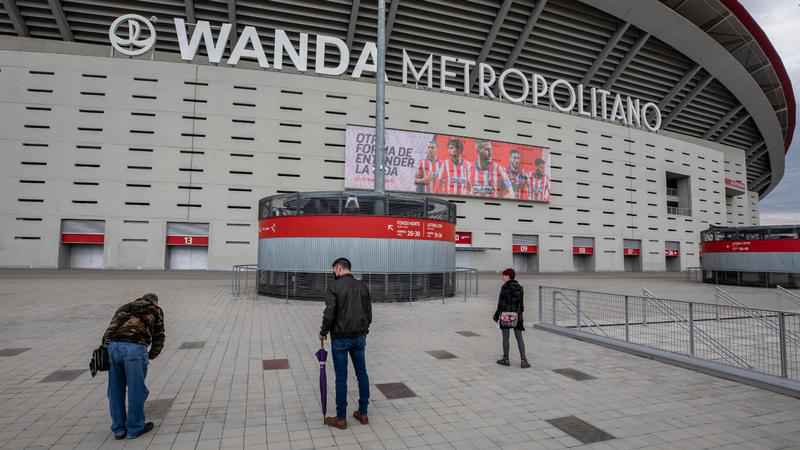Atlético, Inter, AC Milan, Juventus drop out of Super League

A soccer supporter takes snapshots of Atletico Madrid hall of fame plates at the Wanda Metropolitano stadium in Madrid, Spain, Tuesday, April 20, 2021. A group of 12 elite English, Spanish and Italian clubs dramatically split European soccer on Sunday by announcing the formation of a largely-closed Super League. The Super League's founding chairman Florentino Perez on Tuesday, April 20, 2021 says the competition is being created to save soccer for everyone and not to make the rich clubs richer. The Real Madrid president says it's "impossible" that players from the participating teams will be banned by UEFA. [AP Photo/Bernat Armangue]
Atlético Madrid, Inter Milan, AC Milan and Juventus all dropped out of the Super League on Wednesday, leaving the new competition essentially extinct before it even started.
Only Spanish clubs Real Madrid and Barcelona are still officially involved.
The moves by Atlético, Inter, AC Milan and Juventus came a day after the six Premier League clubs involved in the project made it unviable by giving up on the controversial breakaway competition.
English clubs Arsenal, Chelsea, Liverpool, Manchester United, Manchester City and Tottenham deserted plans for the largely-closed competition amid an escalating backlash from their supporters and warnings from the government that legislation could be introduced to thwart them.
The Super League project was overseen by Real Madrid president Florentino Pérez, who promoted it as a way to "save soccer" and the clubs struggling financially amid the coronavirus pandemic.
Neither Madrid nor Barcelona commented after the rest of the clubs abandoned the project. There was some internal pressure on the Catalan club, however, after outspoken captain Gerard Piqué made his view clear.
"Football belongs to the fans. Today more than ever," he wrote on Twitter early Wednesday.
On Monday, UEFA threatened to ban players from the participating teams from playing in this year’s European Championship and next year’s World Cup. But a Madrid court later issued a preliminary ruling stopping UEFA, FIFA and its members from acting against the creation of the new league.
AC Milan signaled it was leaving a few hours after Atlético and Inter Milan made their announcements.
"The voices and the concerns of fans around the world have clearly been expressed about the Super League, and AC Milan must be sensitive to the voice of those who love this wonderful sport," the Italian club said.
Juventus followed moments later, but didn’t completely abandon plans for a future Super League.
"While Juventus remains convinced of the soundness of the project’s sport, commercial and legal premises, it believes that at present there are limited chances that the project be completed in the form originally conceived," the club said. "Juventus remains committed to pursuing the creation of long-term value for the Company and the entire football industry."
Atlético said its decision was made after the board of directors met on Wednesday.
The Spanish club said it "decided to formally communicate the Super League and the rest of the founding clubs its decision not to formalize its participation in the project."
Atlético said the "circumstances" that allowed it to join the new league on Monday "no longer existed today."
"For the club, harmony is essential for everyone involved in the Red and White family, especially our fans," it said. "The first team squad and its coach showed satisfaction with the club’s decision, understanding that sporting merits must prevail over any other criteria."
Atlético fans had been expected to stage a protest before the home match against Huesca in the Spanish league on Thursday. Widespread protests by fans in England played a big part in the decision by the Premier League clubs to leave the new competition.
"I knew the club would make the right decision and that’s what happened," Atlético coach Diego Simeone said. "This is good for everyone."
Inter said the club was committed to delivering the best soccer experience for fans because "innovation and inclusion have been part of our DNA since our foundation."
"Our commitment with all stakeholders to improve the football industry will never change," the Italian club said. "Inter believe that football, like any sector of activity, must have an interest in constantly improving its competitions in order to continue to excite fans of all ages all over the world, within a framework of financial sustainability."
The Super League was intended to be a 20-team competition with 15 founding members guaranteed a spot every season and five other teams rotating in and out. The lack of relegation for the founding members raised concerns about the consequences for smaller clubs in the domestic leagues around the continent.